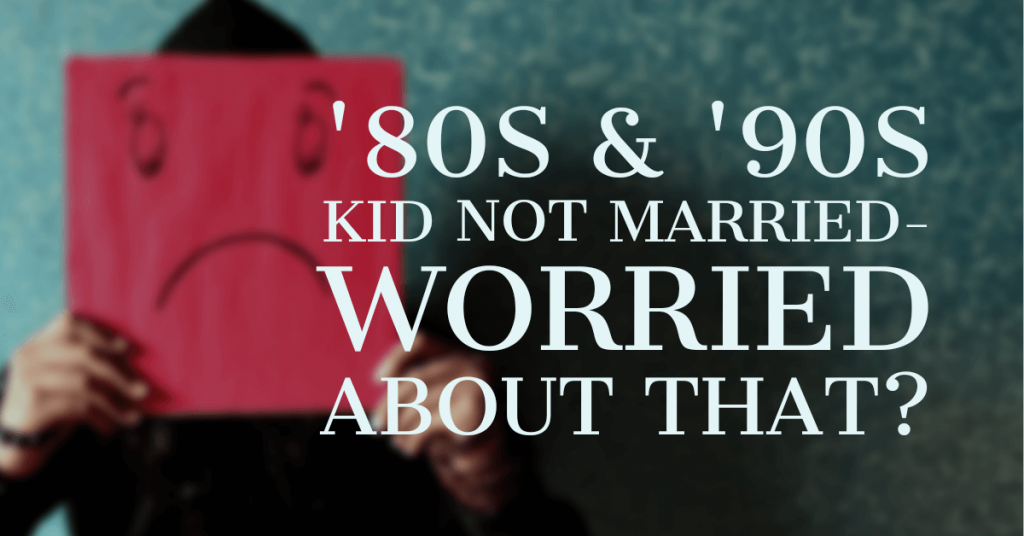In recent years, a noticeable trend has emerged: many 80s and 90s kids are choosing to remain unmarried, breaking away from the traditional norms that once defined adulthood. The question of why 80s and 90s kids are not getting married is becoming increasingly relevant as this generation redefines what it means to live a fulfilling life. With changing values, financial priorities, and shifting societal norms, 80s and 90s kids are questioning whether marriage is the only path to happiness.
Why 80s and 90s Kids Are Not Getting Married: Redefining Relationships and Priorities
Marriage, once viewed as a symbol of stability and security, no longer holds the same significance for many ’80s and ’90s kids. Unlike previous generations, they no longer see marriage as the ultimate goal of adulthood. Instead, they prioritize self-growth, financial independence, and emotional well-being.
A growing number of individuals are choosing cohabitation over marriage. Rather than rushing into legal unions, many 80s and 90s kids prefer to live with their partners first, testing the waters before making a lifelong commitment. This shift reveals a more cautious approach to relationships, driven by the fear of divorce and the failed marriages they saw in their parents’ generation.
Financial Priorities Over Matrimony
For 80s and 90s kids, financial security takes precedence over marital status. With the rising cost of living, student debt, and economic uncertainty, many are hesitant to take on the financial responsibilities that come with marriage.
Interestingly, while marriage offers financial perks such as tax benefits and better social security advantages, many 80s and 90s kids view it as a potential liability. The fear of divorce settlements, legal complications, and financial instability makes them more inclined to stay single or delay marriage.
Emphasis on Personal Growth and Freedom
Unlike earlier generations, 80s and 90s kids prioritize personal growth and self-fulfillment over settling down. They view solitude not as loneliness but as an opportunity for self-discovery. Embracing independence allows them to focus on their passions, careers, and mental well-being without the compromises that often come with marriage.
Moreover, many have come to recognize the beauty of solitude. In their alone time, they experience inner peace, self-awareness, and emotional freedom. For them, this freedom outweighs the traditional expectations of marriage.
Challenging Societal Expectations
Despite living in a modern era, societal pressure to marry still exists. The cultural norm of associating marriage with stability and happiness continues to weigh heavily, especially in countries like India. However, 80s and 90s kids are increasingly defying these expectations.
In India, the skewed gender ratio of 933 women per 1000 men plays a role in shaping marital dynamics. With fewer women compared to men, women have more options when choosing a partner. This dynamic gives women greater flexibility, allowing them to avoid rushed or unsuitable marriages. It also reduces their tolerance for outdated practices such as dowry and abusive relationships, empowering them to seek meaningful connections or remain single.
The Rise of Non-Traditional Relationships
The definition of relationships is evolving. Marriage is no longer the only form of commitment. Many 80s and 90s kids are embracing unconventional relationships, such as long-term partnerships, live-in relationships, and open arrangements. They prioritize emotional connection over legal bonds, valuing flexibility and companionship without societal constraints.
The Impact of Education and Career Aspirations
Higher education and career ambitions have significantly influenced the mindset of 80s and 90s kids. With more women pursuing advanced degrees and high-paying careers, marriage has taken a back seat. Unlike previous generations, they are unwilling to compromise their ambitions to meet traditional family expectations.

Additionally, the pursuit of personal and financial goals has led many 80s and 90s kids to delay or reconsider marriage. They prioritize building a stable career, traveling the world, or investing in personal interests over conforming to conventional timelines.
Lessons from Previous Generations
The reluctance to marry also stems from disillusionment with traditional marriages. Witnessing broken relationships, domestic conflicts, and rising divorce rates has made 80s and 90s kids more skeptical. They have learned that marriage, once seen as a guarantee of lifelong happiness, does not always deliver on that promise.
Furthermore, the outdated notion that divorce is taboo is losing its grip. Many 80s and 90s kids believe that leaving a troubled marriage is better than remaining in an unhappy or abusive relationship. This progressive mindset makes them more selective and cautious about entering into marriage in the first place.
The Evolving Definition of Success
For previous generations, success was often equated with marriage and family life. However, for 80s and 90s kids, success is measured by personal fulfillment, financial independence, and emotional well-being. They no longer view marriage as a requirement for a meaningful or successful life.
Conclusion
The reasons why 80s and 90s kids are not getting married are complex and multifaceted. Financial independence, career aspirations, changing social norms, and the pursuit of personal growth have all contributed to this generational shift. Rather than viewing marriage as the ultimate milestone, 80s and 90s kids prioritize self-awareness, freedom, and emotional well-being.
Ultimately, whether they choose to marry or remain single, the key takeaway is that 80s and 90s kids are carving their own paths, rejecting outdated societal expectations and embracing the freedom to live life on their own terms.

